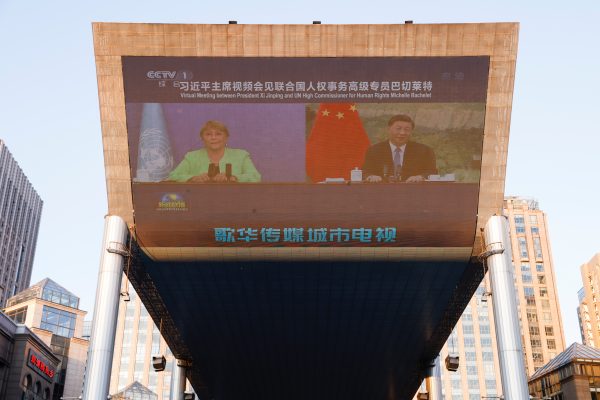In September 2018, Michelle Bachelet’s first address as High Commissioner referred directly to a United Nations report containing ‘deeply disturbing allegations’ that one million mainly ethnic Uyghurs were being arbitrarily detained in ‘so-called re-education camps’.
In March 2019, she asked again for China to ‘engage on this issue’ and for her office to be granted ‘full access to carry out an independent assessment of the continuing reports of … enforced disappearances and arbitrary detentions, particularly in the Xinjiang Autonomous Region’.
More grist to the mill came in June 2020, when about 50 Special Rapporteurs, Independent Experts and Working Groups linked with the United Nations Human Rights Council officially denounced the repression taking place in Hong Kong, Xinjiang and Tibet.
But when the High Commissioner arrived in China in May 2022, she was at pains to affirm that her visit was not an investigation, but an opportunity for dialogue with the country’s most senior officials. This included a virtual meeting with Chinese President Xi Jinping and an in-person meeting with Foreign Minister Wang Yi.
The visit resulted in an agreement to hold annual senior strategic meetings and to establish a working group to continue discussions on topics such as development, poverty alleviation, minority rights, and judicial protection. Left unclear is whether the discussions are to be held wholly in private, contain any benchmarks, include independent civil society actors or have an established timetable.
At the final press conference of Bachelet’s visit, she referenced several lapses in China’s human rights protections — a failure to issue data on the use of the death penalty, a lack of proper judicial oversight of counter-terrorism laws and a need for a full government review of its counter-terrorism legislation.
She voiced concern about developments in Hong Kong, particularly the arrests under the National Security Law and attempts to stifle Hong Kong’s independent media. But these comments were overshadowed by her adoption of Chinese framing in response to other core matters of concern. She also failed adequately to counter a Chinese narrative that alleged her increased understanding of China’s ‘outstanding achievements in human rights development’.
Whereas in 2018, Bachelet used the term ‘so-called re-education camps’ to describe the mass internment facilities, at her press conference she repeatedly used Beijing’s term — ‘Vocational, Educational and Training Centres’ or ‘VETCs’. Worse still, the High Commissioner cast Beijing’s repression of the Uyghurs as typical failures by states during the adoption of counter-terrorism measures. In her response to a question about racial discrimination in the United States she neglected the opportunity to turn that into a specific reference to concerns about China’s discriminatory treatment of the Uyghur population.
A question about the situation of human rights in today’s world led her to note many instances of violations in Sri Lanka, Yemen, Syria, Myanmar, Ukraine and Ethiopia, but not China. Instead, she described the Chinese government as a ‘strong supporter of multilateralism’ and a ‘key global player’ who could help bring a political solution to the war in Ukraine.
Perhaps the High Commissioner’s response to that question gives some sense of the broader context within which she viewed this mission. China is seen as a great power, and she wants her office to have a long-term presence in the country. Her office has even delayed its publication of a report on Xinjiang, probably in order to avoid jeopardising that long-term presence. The UN Secretariat also sees China as vital to the success of the organization’s Sustainable Development Goals. Prominent in some of her remarks was her view that Beijing can exercise leverage over Russia and help end prosecution of its brutal war in Ukraine.
Seemingly, her choice was to voice stronger criticisms only in private venues or once she had left the country. Her annual report given in Geneva at the 50th Session of the Human Rights Council — more than two weeks after her visit to China — is slightly more forceful in its depiction of the wide-scale abuses the Chinese authorities have perpetrated against Uyghurs and other minorities in Xinjiang.
Past experience demonstrates that the official outcomes of the visit are unlikely to improve the human rights situation in China. Instead, this visit has damaged the High Commissioner’s own integrity and that of the United Nations and its efforts to deal with mass human rights violations in large parts of the world.
Rosemary Foot is a Professor Emerita and Senior Research Fellow in International Relations, and Emeritus Fellow, St Antony’s College, University of Oxford.

